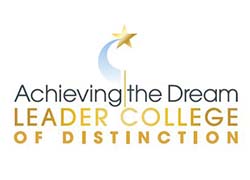Community Colleges Count
 Over the last decade, Montgomery County Community College has strived to improve student
learning outcomes by developing and implementing innovative programs and processes
that help students gain access to higher education and achieve their goals.
Over the last decade, Montgomery County Community College has strived to improve student
learning outcomes by developing and implementing innovative programs and processes
that help students gain access to higher education and achieve their goals.
Through the College's participation in Achieving the Dream: Community Colleges Count, a national non-profit organization committed to helping more community college students succeed, our faculty and administrators work with national experts to identify strategies that improve student outcomes. Our participation in the initiative underscores the College's commitment to student access and success, which anchors our strategic plan.
In recognition of our commitment to student success and sustained improvement on key student achievement indicators, Montgomery County Community College earned the designation as a Leader College by Achieving the Dream in 2011, and the designation was reaffirmed in 2017. According to Achieving the Dream, Leader Colleges have demonstrated commitment to and progress on its four principles – committed leadership, use of evidence to improve programs and services, broad engagement, and systematic institutional improvement. Leader Colleges have also shown three years of sustained improvement of student success in one or more measures.
Specifically, the College was commended by Achieving the Dream for our work to improve student outcomes in developmental courses, our development and launch of a Minority Male Mentoring Program, and our use of data to make informed decisions about teaching and learning.
Through our student success work, significant adjustments have been made to the way we deliver developmental or pre-college level, courses–especially developmental math. In 2006, Assistant Professor of Mathematics Barbara Lontz developed a new approach to basic arithmetic, called Concepts of Numbers.
Organized by concepts rather than topics, students start with problems and work together to learn the algorithms to solve them. Under the new approach, students succeed at 20 percentage points higher than those enrolled in courses that utilize a traditional approach. Concepts of Numbers was brought to scale for fall 2011, with 100 percent of all basic arithmetic sections using the approach.
In 2009, the College launched its Minority Male Mentoring Program to close the nationally-documented achievement gap for African-American male students. The program assists minority male students to cope with their everyday challenges by connecting volunteer faculty, administrators and staff with students who choose to opt in. With 200 mentees and 57 mentors, early data shows promising results with 92 percent of participants persisting from fall 2009 spring 2010 and 88 percent from spring 2010 to fall 2010.
In early 2011, Montgomery County Community College was recognized by Achieving the Dream for our strong use of data to impact student success and completion. Access to an analysis of this data enables us to continually make process improvements that remove unnecessary barriers and provide interventions to at-risk students.
The award provided seed money that we used to develop a Gatekeeper Course Academy, which provides faculty with resources and support necessary to further examine student performance in 14 targeted gatekeeper courses.
In early 2014, Montgomery County Community College was named a national dual winner of the prestigious Leah Meyer Austin Award at the 2014 annual Achieving the Dream conference. According to Achieving the Dream, the College was recognized for “building whole-college solutions to improve student success and equity, which have resulted in noteworthy increases in student success.”
Achieving the Dream named Montgomery County Community College as a 2019 Leader College of Distinction for its work in achieving new, higher student outcomes and narrowing equity gaps. Specifically, ATD recognized Montgomery County Community College for its innovative work to improve student success outcomes through three interventions – 24/7 online tutoring, a new student onboarding process and a new course withdrawal process.
With these interventions and other supports, two specific groups of students – student-veterans and students receiving Pell grants – are completing gateway courses more successfully and have improved retention and transfer and degree attainment rates.
